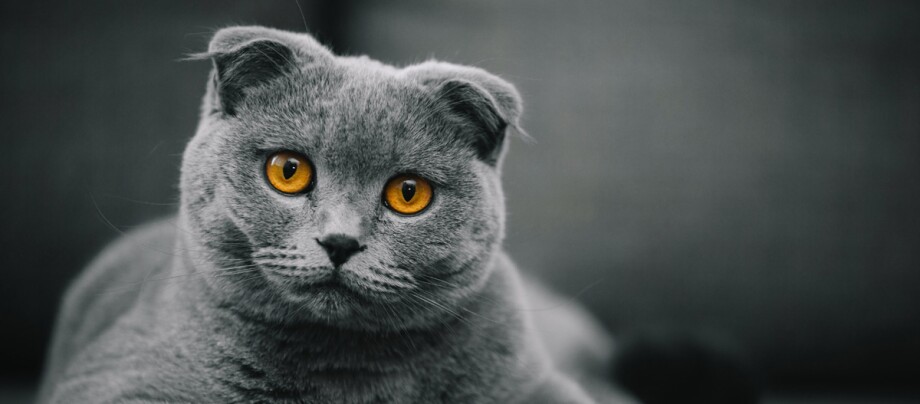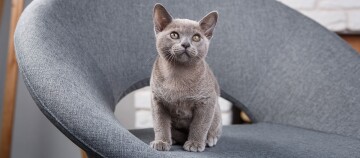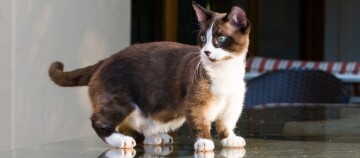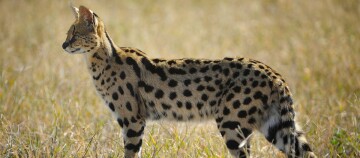Scottish Fold - Empathetic, Silent, Shorthaired Cat with Folded Ears
01.01.2024 - Reading time: 3 minutes

Folded instead of floppy ears: While most cat species have more or less large, upright ears, those of the Scottish Fold are curiously shaped. Also known as the Scottish fold-eared cat, the cat has forward overhanging ear tips, giving its face a rounded appearance. The folded ears are hereditary, as the cartilage formation in the body is disturbed. Unfortunately, the same gene can also lead to painful joint deformities, which restrict their movements.
NewsletterScottish Fold
Breed | Scottish Fold |
Origin | Great Britain |
Size | medium-sized, 35 to 55 cm (head-torso length) |
Weight | 4 to 5 kg (tomcat), 2 to 4 kg (female cat) |
Physique | compact and strong, stocky legs, round paws |
head shape | roundish with broad nose and strong chin, “babyface” |
Eyes | all colours |
Coat and colour | medium-length, dense and fluffy, all colours except lilac, chocolate and Siam Point |
Coat care | medium-length, dense and fluffy, all colours except lilac, chocolate and Siam Point |
Nature | calm, friendly, intelligent, affectionate |
Special features | “Folded ears” due to gene mutation |
Owning | indoor, optional outdoor access in secured area |
Scottish Fold: nature
The Scottish Fold is among the quieter varieties of pedigree cats. It rarely “communicates” with its human companions by meowing and is also not a cat of action that wants to romp all day long. This is the result of the above-mentioned genetic defect, which can lead to painful arthrosis and therefore restricts the cats’ mobility. Scottish Folds are also known for their empathy. They carefully register the mood of their human companions and, depending on the situation, react with affection or playfulness.
Keeping and Care of Scottish Fold Cats
The gene that is ultimately responsible for the folding ears also affects other areas of cartilage and bone structure. There is therefore an increased susceptibility to osteochondrodysplasia (OCD) in the Scottish Fold. Possible signs of this disease are, for example, tenderness, arthrosis, lameness and thickened joints. Often these symptoms need to be treated with painkillers for life. Nevertheless, this cat values the company of its fellow felines. A more peaceful living environment will suit its needs, as noise and bustle are not to its liking.
Cats generally attach great importance to cleanliness. The Scottish Fold places a further premium on this: The animals insist on strict hygiene, especially when it comes to the litter tray, which should be cleaned at least once a day.
Whilst coat care is undemanding for cats – occasional brushing with a coat mitt or soft brush will suffice – you should check your Scottish Fold’s ears every day and clean the outer ears with cotton wool and warm water.
Scottish Fold Colours
Scottish Fold Cats are recognised according to breed standards in a wide spectrum of colours: All colours are permitted except lilac, chocolate brown and the typical “Siamese Point” colouring. Permitted coat markings are a tabby or mackerel pattern, as well as tortoiseshell and spotted.
Important note on the cultivated breed
Occasionally, a genetic defect in cats results in cats with folded ears. The anomaly causes a cartilage malformation in the ears. The ears fold over due to a lack of stability. Unfortunately, the same gene can also lead to painful joint deformities and osteoarthritis. In the case of the Scottish Fold, fold-eared animals were deliberately bred from the 1960s onward. The genetic basis is also the reason why the Scottish Fold is not recognised as a breed by all cat breeding associations worldwide – not even by the international federation Fédération Internationale Féline (FiFe). In some German states, breeding is strictly prohibited. Crossbreeds, such as those bred with British Shorthair cats, have also been found to be diseased. Always ask a reputable breeder about the origin of a Scottish Fold before you buy one – unfortunately, kittens from dubious breeding are often offered for sale because they have become popular as “fashionable cats”.
The “Qualzuchtgutachten” (expert report on abusive breeding), commissioned by the Federal Government in 1999 with the cooperation of the German Animal Welfare Association, recommends a breeding ban for cats with Fd gene-related “folded ears”.
Sources:
Expert report on abusive breeding (PDF)
Animal Welfare Association on the subject of Abusive Breeding





